- Home
- Tony Roberts
Prince of Wrath Page 6
Prince of Wrath Read online
Page 6
Argan squeezed her and nodded. She moved away and looked down at him. His face was wet and red, so she pulled out her delicate face cloth and wiped the boy’s face, smiling at him .
Argan couldn’t sniff since his nose was still blocked from the bleeding. “Thank you, mother,” he said in a small voice.
“Now stop talking and go to sleep; you’ve had an upsetting evening and you need to calm down now.”
“Why are you crying, mother?”
Isbel wiped her own tears away hurriedly, and then composed herself. “I get upset when you’re unwell.”
Argan hugged Skidus close. “I’m sorry, I don’t mean to be unwell.”
“I know. Now sleep!” Isbel kissed him on the forehead and made her way to the door, looking back on her son briefly before she left the room. He waved at her, his fingers clawing the air, and she smiled and waved back. Outside the room she made sure the guard was alert and correct before making her way down the corridor to Istan’s room. In comparison with Argan, she wasn’t looking forward to visiting her youngest son. She wondered how it was that one child could be so loving and considerate while the other so malicious.
Istan’s room was a contrast to that of Argan’s. The five-year old was fairly destructive so any breakables had been removed, particularly anything that would injure the child if it were broken. Istan was sat on the floor in his night clothes, hitting his cloth dolls with a stick. It was something he frequently did, and Isbel had thought about taking the stick away from him but had been talked out of it by Gallis who said that Istan needed to get his aggression out in some form, so the stick had remained.
“Come on, Istan, bed time,” she said, approaching him. As was usual, Istan ignored her and struck his dolls even harder, his face a set mask of concentration. Isbel sighed and picked him up. Istan struggled, emitting a cry of outrage, and his arm swung. Isbel knew what was coming and had anticipated it, blocking the arm and tearing the stick out of his hand. If she hadn’t, it would have struck her across the head.
Istan now kicked out, attempting to force his mother to put him down. Isbel struggled across the room and put him onto the bed. Istan rolled away and bounded off the bed on the other side, running round towards his stick. Isbel beat him to it and picked it up. Istan made an angry sound and kicked out, his face contorted with rage.
“Istan! Stop it!” Isbel snapped. “I’ll take the stick away and you’ll never see it again, do you hear? Now get into bed and get to sleep!”
The boy sulked and huffed towards the bed, knowing the moment his mother was out of the room he would get out and carry on playing. He’d made his point, pleased to have annoyed her, so now he would pretend to be obedient. Isbel tucked him in and placed the stick on the toy box lid across the room before sitting on the bed.
“I wish you’d be a good boy like Argan,” she said wistfully. “I don’t know why you’re so naughty. You are not to take food from anyone’s plate again, do you understand? It’s not the way a prince behaves, and if you really want to be a prince when you grow up you’ll have to learn to behave and act like one. If you don’t, then you’ll never be one.”
Istan smiled at her. It wasn’t a warm smile and it disturbed Isbel. Was Istan inherently evil? She tried her best to treat him the same as Argan, but it made no difference whatsoever. She was at her wit’s end with him. It was as if he deliberately went out of his way to defy her and anyone else who put up restrictions. He saw them as challenges to overcome, whether they were to his advantage or not.
As she made her way to her chambers that was what dominated her thoughts, rather than Argan’s illness.
CHAPTER FIVE
Astiras spat into the morass that formed the ground outside Zofela. The place was full of filth already so it made no difference. Teduskis and Captain Sepan stood with him, all of them looking at the line of prisoners chained together being herded down towards the distant canalised new river. Astiras had decided to revert the river back to its original course, close to Zofela, rather than what had been done during the siege.
The prisoners had built their temporary quarters in a fenced-off camp outside the city and had buried the Kastanian dead. Now they were to be the labour force to bring the river back to Zofela. Soldiers escorted them, making sure nobody tried to flee, and that all would obey their new masters. Satisfied, Astiras nodded and waved the two others to return with him back to his office in the castle.
Once there Astiras seated himself and spread a wad of papers and parchments across the desk. “I think that war is a preferable state than peace,” he said, flicking the first sheet in disgust. “At least when I’m at war I don’t have to deal with this sort of rubbish. Look at this!” he waved the sheet in the air. “My daughter complains that the Empress has dismissed Argan’s sword-master Panat and his son because my boy has had a falling accident! What the fires of damnation are they thinking of? Is my time merely to deal with this sort of thing?” He threw the paper down with a snort of exasperation. “I’m expected to make some sort of response! I know what I’d like to do – go down there, spank my wife and pin up a blasted decree banning any of my appointments being sacked without my say-so!”
Teduskis sneaked a sideways look at Sepan. The captain was standing with his face deadpan. The bodyguard cleared his throat.
“Yes?” Astiras glared at Teduskis. “You have something to say?”
“We are establishing a regular courier service between here and Kastan City. A letter could go tomorrow and be there in a sevenday.”
“The point I’m making, Teduskis,” Astiras leaned forward, a stubby finger jabbing in the air, “is that my time is being wasted! Do they need leading by the hand up the path each time I leave the capital? The gods have mercy on me! And then look at this,” he grabbed a second paper. “Thetos Olskan in Turslenka has had to quash a rebellion and now asks if he can march on the Duras blockading Kalkos and the road to Kastan City. Is he insane? What does he think he has there? The Imperial Guard? He’s got a bunch of militiamen and second-rate garrison troops under the command of chinless smooth-faced noblemen’s sons whose idea of a crisis is whether to piss or shit!”
Sepan glanced at Teduskis. As the captain of a militia company he wondered whether the Emperor considered his men in the same light. Astiras saw the movement. “Oh, Captain, rest assured, I have faith in you and your men to perform well; you’ve proved yourselves both in battle and on campaign here. I don’t class you and your men the same as Olskan’s.”
Sepan relaxed and nodded. Teduskis though wished to continue. “Sire, this province needs rebuilding now the war is over, and that will require a great deal of administrative work. You’ll need the right people in the posts necessary to do this.”
“Don’t tell me the obvious, Teduskis,” Astiras grumbled. “I want to see my estates, if there’s anything left of them after all this time. I’m willing to bet those Bragalese bastards burned it to the ground.”
“Is that wise, sire? Surely you’re needed here to organise the town and province?”
The Emperor grinned. “You said yourself that I need the right people in the right posts, and we have with us a whole company of former administrators. The militia are full of them!” He looked at Sepan. “Captain, I have amongst all this your report, and I must say I’m very impressed by it. Where is it?” he rummaged through the pile of parchments, throwing a couple over his shoulder irritation. “Ah, here we are.” He held up a couple of sheets before him. “Very neatly written, concise, informative. Here, have a look, Teduskis.”
The bodyguard took them and gave them a brief examination. His eyebrows went up and he looked at the captain next to him. “Nice. Didn’t know you were capable of this.”
Sepan cleared his throat delicately. “Ah, I had a couple of my men, former palace scribes, compose it under my dictation last night, sir.”
Astiras took the report back. “Then, Captain, you have the beginnings of an administration here. Employ these people in this off
ice under your command. You, Captain, are appointed castellan of Zofela, effective forthwith. Congratulations.”
Sepan looked stunned. He stared at the Emperor, then bowed. “My thanks, sire. But I have no previous experience of such a post.”
“I wasn’t Emperor before I took up the position,” Astiras said, heaving himself out of his chair, “but I’ve done a reasonably good job, wouldn’t you say?”
Sepan nodded enthusiastically. What else could he say? No, sire, you’ve fucked up big time? “Then I shall set to my new post at once. I may need more to assist me, however.”
Astiras showed him to the desk. “Captain, in my absence you will run Zofela. You know what I want; a clean, tidy town. No Bragalese. New people given rent-free incentives to come live here, and money to build new facilities, starting with a decent barracks. Organise a trade route from here to Kastan City, and also to Turslenka. We may also have to accommodate the Mazag. Worry not, I shall base myself here for the next couple of years. I don’t trust the Mazag nor the locals. But I think nobody will dare try anything as long as I’m here!”
Sepan bowed and seated himself gingerly. Astiras slapped Teduskis on the shoulder. “So! Let’s get on our equines and ride to my estates. I want to see if they’re still there.”
They rode with the Imperial Bodyguard out of Zofela’s main gate. Zofela had two gates, the northern one which was named the Frasian Gate and the southern one called the Mazag Gate. Astiras cared little for what the Bragalese had named them. He didn’t want to know and, besides, they were no longer in control of the town or the province. What he said went, and nobody had the authority to contest that.
The landscape surrounding Zofela was spectacular. Mountains rose to north and south, snow-capped jagged peaks, while to the east and west the land was less mountainous, but still hilly. The long valley was dotted with farms further away from the town, and beyond Astiras knew the land changed to rolling plains, rich in timber and crops. The province was criss-crossed with dirt tracks but nothing that could be described as being proper roads. Once, a long time ago, there had been, but these had gradually declined and had been washed away in floods or torn away in landslides, and elsewhere they had suffered the same problem from invasion, neglect and even been the victim of other routes becoming more important over time.
Now there were hardly any traces of the original road network left. Where they still existed they went nowhere, for the locals had created new routes that by-passed the isolated remnants. Bragal was larger in area than Frasia and was as large as any province that existed within the Empire. To the west it was bounded by the Sea of Balq, to the south the great River Ister, the north the provinces of Frasia and Makenia, and to the east the mountainous region known as Kral, which formed part of Venn.
Astiras knew that the southern and eastern parts of Bragal would still be wild and outside imperial control for the time being, but eventually his control would extend to even those parts. He needed the frontier manned and watched, just in case his neighbours decided to invade. He also wanted a trade route safety established, and a wild and unpatrolled frontier would mean banditry and robbery, and this he wouldn’t countenance.
For the moment, though, his mind was on his former estates, to the east of Zofela in the next valley. During the siege he’d not been able to take a look but now that hostilities had ended he felt it was time. The fifty-man squadron rode easily along the bottom of the Zofela Valley, the river to their right. Here the land was grassy and looked fertile, not having suffered in the siege, and the river hadn’t been diverted.
The mountains rose sheer to either side, but the valley was fairly wide. Up ahead the land rose to a pass that separated the valleys. The river tumbled down into the Zofela Valley in a series of mini waterfalls, meandering lazily where the land was flat. A few shepherd’s huts could be seen, and here and there a small farm. The higher they went there were more huts and less farms, until they reached the top of the pass. They turned and looked back.
Zofela stood in the distance, a black blight on the beauty of the valley. Astiras knew that in a year or so it would fade and the land become green once more. It would need careful husbandry and tending to make it fertile once more, but he was confident he would be able to attract enough farmers and artisans to Zofela to make it a viable and important centre of the Empire. The ravages of war would pass, given time.
The other side of the pass fell away gently. The river didn’t come this way; it had turned off into the mountains, which was from where it sprang. This valley was wider, and opened out to the north much more than the Zofela Valley had. To the south the same mountain range ran off into the distance, a series of white peaks in row upon row. Ahead, as the land fell, there came woodland. Sparse at first, but gradually thicker and thicker until it almost could be called a forest. This was what had made the Koros rich, timber. Their estate was in this valley, at the centre of logging country.
They had made sure that they hadn’t destroyed the woods, for to do that would have destroyed their basis of wealth. For every tree cut they planted one. The business had been well organised, having a logging division and a planting division, equally administered from the estate lying at the bottom of the valley directly ahead.
Astiras sat in the saddle, breathing in the air. He had returned! Nothing looked destroyed, but forests would endure no matter how many wars there were. He waved the scouts on and they trotted off down the track into the deeper part of the woodland. Astiras knew that the track snaked down into the valley, then branched into three. The middle track ran straight to the estate; the other two ran past it at a distance, one eventually to the River Ister, the other to Kral. They would pass through villages, and he wondered whether the four villages that had been in the valley were still there. They had been all Bragalese, but he’d never had any issues with those villages. He’d made it known that their relatively rich livelihoods depended on the Koros estate continuing.
It had been abandoned when the war had started, and the best part of a decade had gone by now. The woodland would be wild. It needed constant care with coppicing and thinning, and so ten years of neglect would mean a lot of hard work to begin with. He hoped the manpower was still there to enable that. He’d also need a foreman and business administrator. The old ones had probably died in the war.
They strung out into a long line, Astiras riding in the centre with Teduskis just in front. They were veterans of the Bragal War, and had learned much in the past few years as to how to travel in the region. The trees were not yet in leaf but the buds were growing fat, and it wouldn’t be long. Avians were calling in the woods, establishing territories or seeking a mate. The occasional animal scampered from their approach, frightened by the pounding of hoofs or the unfamiliar tinkling of metal.
Astiras looked to left and right. Nothing. Up ahead, just beyond the distant figures of the scouts, a treeload of avians suddenly sprang into the air, startled. Astrias cursed and hauled on the reins. “Recall the scouts!” he snapped.
Teduskis sent two men forward rapidly to bring the scouts back. He waved the rest to stop and string out. “What is it, sire?”
“Something sent those avians up into the air up ahead,” Astiras nodded at the large gnarled giant tree that stood down the track, silent, threatening. “Someone, more like. Send two groups out wide to find out exactly what.”
“On foot, sire?”
“Four on foot, three behind mounted. Arrowhead formation.”
Teduskis saluted, slapping his chest. In moments a group began slipping through the woodland on either side of the track. The men on foot were armed with shiny steel swords, forged in Kastan city, and shields sporting the coat of arms of the Empire, two purple rings, one above the other, with a single vertical bar running through both. The men on equine back behind them had spears as well as swords and spiked clubs. They had learned to adopt missile weapons in the war.
Astiras waved the remainder on slowly, cautiously. If archers were in the tre
es ahead, then they would soon come under attack. The two flanking groups would give whoever it was ahead food for thought, however.
As one, the three separate units closed in on the thick growth of trees. Astiras waved his men to halt and indicated to the flankers to curl round the stand of huge trees. He then nodded to Teduskis to take ten men and close in on the stand from the track. The woods had gone quiet. Astiras slowly drew out his sword, a gleaming, oiled weapon with a hilt wrapped in leather and sporting a pommel that had a hunting avian’s wings inset in blackstone on a silver background.
As the flankers began to creep in towards the rear of the trees, the undergrowth burst into life. Figures suddenly sprang up and fled in various directions. “No killing!” Astiras yelled. He wanted to see who it was and what they were doing there.
His men sprang after the fugitives and for a few moments there came confused shouting and crashing of branches, bushes and saplings. Then all was quiet. Figures began to converge on the track, prisoners held by the arms, roughly being herded towards the Emperor. Astiras waved his men to form a circle and waited, his sword tip pressed into the earth. There were four prisoners, all marched swiftly into the circle. They looked like typical Bragalese villagers, dressed in dull colours of green, brown or grey. They had brown hair and swarthy complexions.
“Now,” Astiras said, eyeing the four who were sullenly standing before him, still being held, each looking at the ground in front of them. “What are you doing here on my land?”
He got no response. He nodded to Teduskis who could speak fluent Bragalese. So could Astiras but he was damned if he would stoop to speaking a language he detested. His right-hand man repeated the question.
One of the prisoners, the tallest and with a shock of curly hair, looked outraged. Teduskis translated his response. “This is our land, our valley. You are trespassing.”

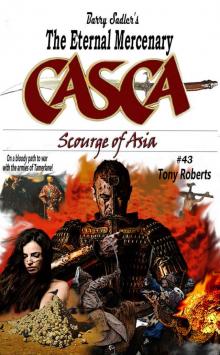 Casca 43: Scourge of Asia
Casca 43: Scourge of Asia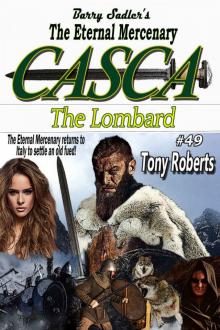 The Lombard
The Lombard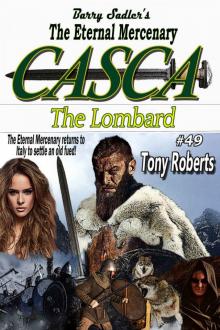 Casca 49: The Lombard
Casca 49: The Lombard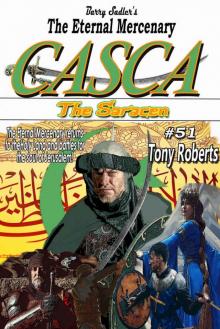 The Saracen
The Saracen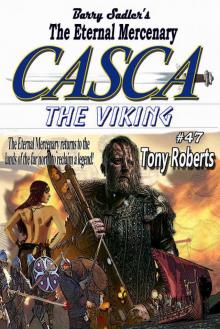 Casca 47: The Viking
Casca 47: The Viking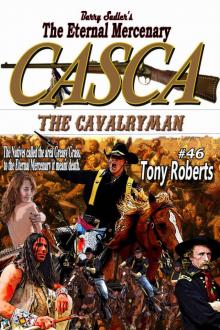 Casca 46: The Cavalryman
Casca 46: The Cavalryman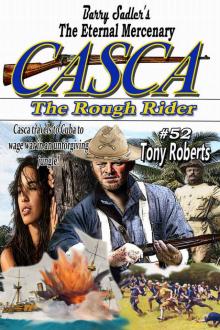 Casca 52- the Rough Rider
Casca 52- the Rough Rider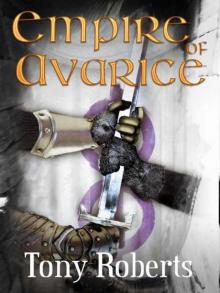 Empire of Avarice
Empire of Avarice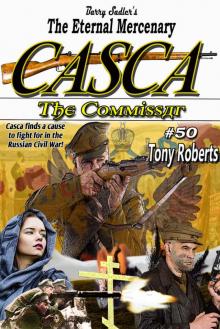 The Commissar
The Commissar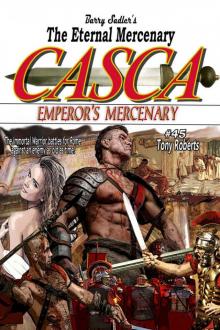 Casca 45: Emperor's Mercenary
Casca 45: Emperor's Mercenary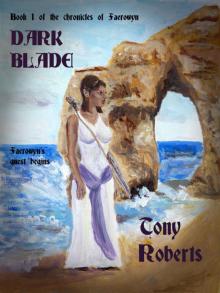 Dark Blade
Dark Blade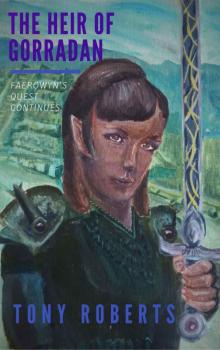 The Heir of Gorradan (Chronicles of Faerowyn Book 2)
The Heir of Gorradan (Chronicles of Faerowyn Book 2)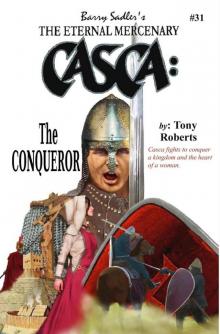 Casca 31: The Conqueror
Casca 31: The Conqueror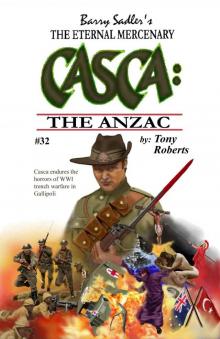 Casca 32: The Anzac
Casca 32: The Anzac The Anzac
The Anzac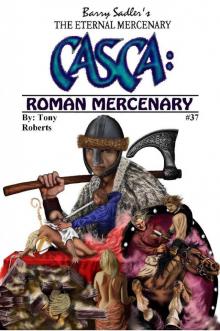 Casca 37: Roman Mercenary
Casca 37: Roman Mercenary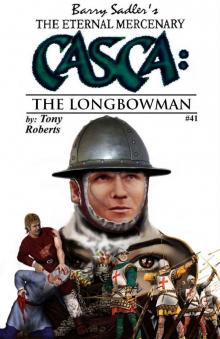 Casca 41: The Longbowman
Casca 41: The Longbowman The Longbowman
The Longbowman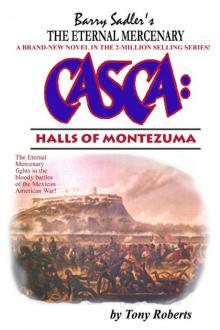 Casca 25: Halls of Montezuma
Casca 25: Halls of Montezuma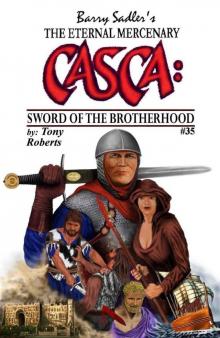 Sword of the Brotherhood
Sword of the Brotherhood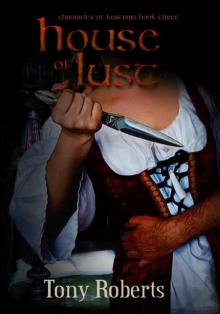 House of Lust
House of Lust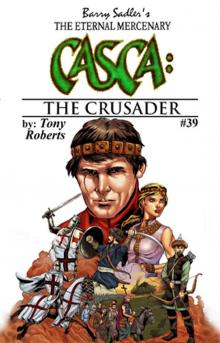 Casca 39 The Crusader
Casca 39 The Crusader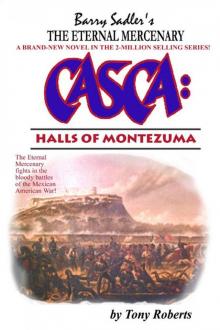 Halls of Montezuma
Halls of Montezuma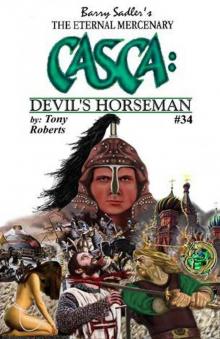 Devil's Horseman
Devil's Horseman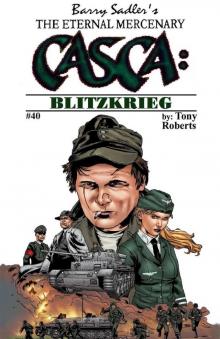 Casca 40: Blitzkrieg
Casca 40: Blitzkrieg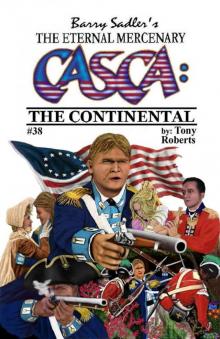 Casca 38: The Continental
Casca 38: The Continental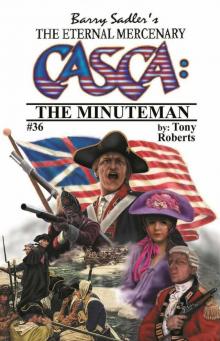 The Minuteman
The Minuteman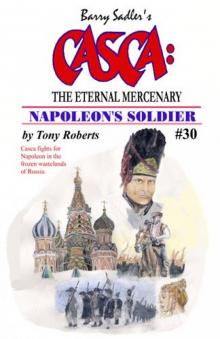 Napoleon's Soldier
Napoleon's Soldier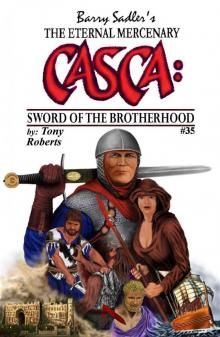 Casca 35: Sword of the Brotherhood
Casca 35: Sword of the Brotherhood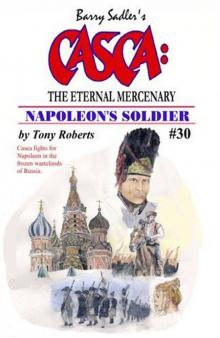 Casca 30: Napoleon's Soldier
Casca 30: Napoleon's Soldier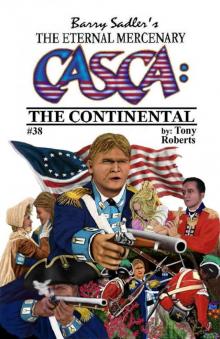 The Continental
The Continental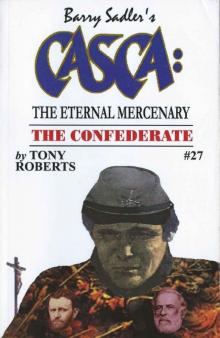 The Confederate
The Confederate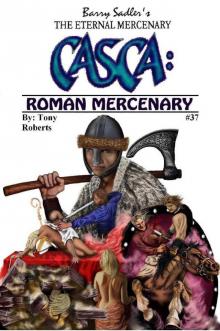 Roman Mercenary
Roman Mercenary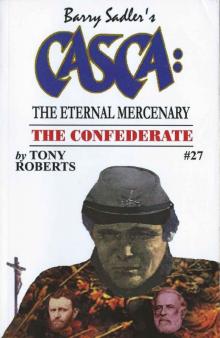 Casca 27: The Confederate
Casca 27: The Confederate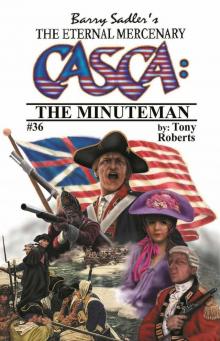 Casca 36: The Minuteman
Casca 36: The Minuteman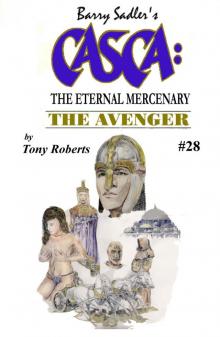 Casca 28: The Avenger
Casca 28: The Avenger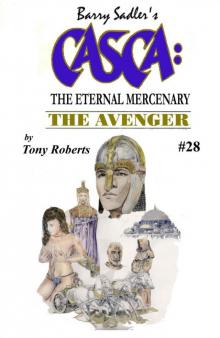 The Avenger
The Avenger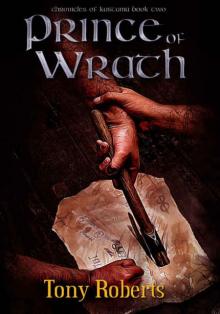 Prince of Wrath
Prince of Wrath